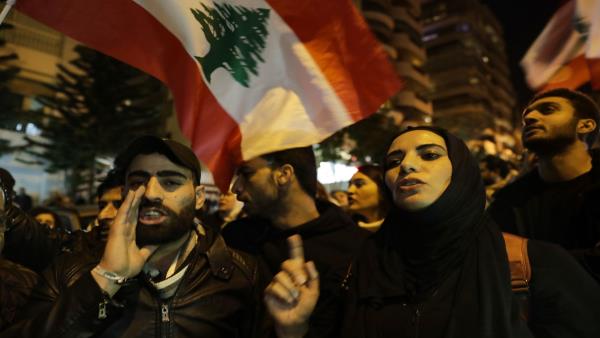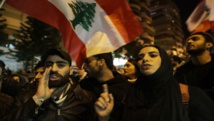"Enough is enough," shouted one demonstrator on a road leading to the capital Beirut.
Protesters used burning tyres to block main roads and stop people from going to work, as main roads in south, east and north Beirut were also blocked by protesters.
Lebanese army soldiers and police were deployed to try to open major roads.
In December, Lebanese President Michel Aoun asked professor Hassan Diab to form the new government after binding consultations with parliamentary blocs.
But so far Diab has not been able to form a government due to political bickering between the various Lebanese political parties.
"We gave Diab few weeks to form a government. Now it is over, we will be back on the streets," said one protester.
Protesters sitting on the ground blocked Ring Crossing, which was a main crossing point of the front line during the 1975-1990 civil war.
"We have demands and we are not negotiating," shouted another protester.
In Jal al Deeb, north of Beirut, trucks blocked the only and main road leading to north Lebanon.
Protesters were standing in the middle of the road while songs calling on Lebanese to take to the streets echoed in the area.
"Revolution, revolution, we will continue our way," one of songs was heard across the mainly Christian area.
Another group of protesters moved close to the house of Diab, calling on him to resign on late Tuesday.
"Leave, leave, we do not want you," the protesters who were banging on pots and pans chanted.
The protests have left Lebanon in economic and political turmoil, seen as the worst crisis since the civil war.
Since the protests started, the Lebanese pound has lost value against the US dollar, which is widely used in Lebanon.
On Tuesday, the Lebanese pound was trading around 2,400 to the dollar on the black market. The pound stood at 1,515 to the dollar before the protests started in October.
Protesters used burning tyres to block main roads and stop people from going to work, as main roads in south, east and north Beirut were also blocked by protesters.
Lebanese army soldiers and police were deployed to try to open major roads.
In December, Lebanese President Michel Aoun asked professor Hassan Diab to form the new government after binding consultations with parliamentary blocs.
But so far Diab has not been able to form a government due to political bickering between the various Lebanese political parties.
"We gave Diab few weeks to form a government. Now it is over, we will be back on the streets," said one protester.
Protesters sitting on the ground blocked Ring Crossing, which was a main crossing point of the front line during the 1975-1990 civil war.
"We have demands and we are not negotiating," shouted another protester.
In Jal al Deeb, north of Beirut, trucks blocked the only and main road leading to north Lebanon.
Protesters were standing in the middle of the road while songs calling on Lebanese to take to the streets echoed in the area.
"Revolution, revolution, we will continue our way," one of songs was heard across the mainly Christian area.
Another group of protesters moved close to the house of Diab, calling on him to resign on late Tuesday.
"Leave, leave, we do not want you," the protesters who were banging on pots and pans chanted.
The protests have left Lebanon in economic and political turmoil, seen as the worst crisis since the civil war.
Since the protests started, the Lebanese pound has lost value against the US dollar, which is widely used in Lebanon.
On Tuesday, the Lebanese pound was trading around 2,400 to the dollar on the black market. The pound stood at 1,515 to the dollar before the protests started in October.









 Home
Home Politics
Politics











